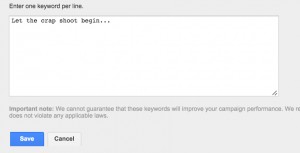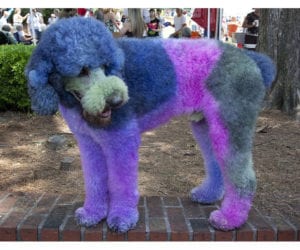If you’ve ever worked in the marketing industry before, you’ll have heard the saying “cast a wide net”. This is often accompanied with comment of “and narrow from there”. The premise is simple, you cast a wide net to ensure you’re reaching a broad audience with your campaign, then as data starts to be collected on conversion rates, you start weeding out the poor performers, and slowly but surely your campaign becomes optimized. This is at least true for digital marketing, in print, you’re forced to cast a wide net, wait for the results, then based on those results you make sure your next campaign doesn’t make the same mistakes. This has been the tried and true method of the advertising world for many years. When it comes to digital however, there’s now better way.
We’ve been in the digital marketing game for many years, and as one would suspect, you begin to find better ways to do the same old things. In this post I’ll show you how I’ve learned that casting a wide net is actually a giant waste of time and money, and how flipping this idea on its head is a much better approach to keyword strategy. This type of strategy is effective on any PPC engine that is used, as both Google & Bing use the type of keyword filtering that we need to make this happen.
The Old Way
Like most digital marketing agencies, we are guilty of following this tried and tested method of meeting with the client, gaining insights into their business, developing a keyword list, writing ads, launching a campaign, monitoring results, and refining/optimizing constantly. There’s nothing wrong with this strategy as a whole, it is effective and it works, but there are some inefficiencies. Here’s my #1 beef with this strategy – it can be costly.


Depending on your business and the keywords you’re going after, this may be your only option. If, for example you’re trying to promote an event/program that doesn’t have a brand behind it, or no real keyword queries that would fit perfectly, casting a wide net is a good strategy to employ. But when you’re trying to sell a specific product, or service that is frequently searched or in a category of frequent searches, then it is not.
The Root of All Evil
A common root cause of casting a wide net in keyword strategy is this keyword type: broad match. Broad match is my biggest frenemy. I hate it most of the time, but love it in specific situations. If you make a campaign and add in your keywords directly into the box as shown above, you’re making broad match keywords. It is the default keyword type offered by Google. Broad match is Google’s wide net strategy. And they fully admit to this in their description of it:
“When you use broad match, your ads automatically run on relevant variations of your keywords, even if these terms aren’t in your keyword lists. This helps you attract more visitors to your website, spend less time building keyword lists, and focus your spending on keywords that work.”
So here’s why it causes problems. If you type in a pretty specific keyword, for example – dog jackets – we’re using 2 terms here, so already we’re doing a good job of targeting and you’d expect pretty relevant results. Well, here’s a possible list of search queries this keyword could trigger your ad to show for:
| pictures of bulldogs in coats navy lab coats animal clothing sweaters for my pet Should my dog wear a jacket? |
life jackets for my pet dog jacket sewing patterns DIY dog coats dog fur trade making jackets remove white dog fur from my clothes |
Whoops.
So we’ve spent a ton of money already just to learn of words we should add as negatives. This is also my second biggest beef with this strategy, you’ll have to check back constantly to ensure you’re weeding out negatives, and this takes up a bunch of time and effort. We thought this was a necessary evil for the longest time, and in truth, this will never really go away, but you can save yourselves a ton of time by using a different type of keyword, that few know about.
The New Way
We now take the exact opposite approach to keyword strategy. Instead of casting a wide net, we start with a very narrow one, and we use a different type of keyword targeting – it’s called broad match modifier. It is pure genius.
Broad match modifier allows you to target any specific keywords typed into in a phrase that you designate. Words can appear in front or after your terms, or their order can change, but this keyword type will only allow simple variations (like plurals) and no synonyms. No synonyms is the best part. You can now dictate to Google the specific words that must be in a phrase that you want to show up for. This is done by adding a “+” in front of the keyword in Adwords. When considering that Google sees 500 million “never-before-search” queries a day, this can come in handy. So, in order to by hyper-specific, we’re going to use this keyword as an example:
+blue +dog +jacket
Now, we’re telling Google that each of these words must be in the query. If they aren’t, it won’t show. Nice. Okay, but in this instance this is a very narrow net of people likely to be using this keyword. And depending on your geographic targeting, you may receive no searches whatsoever. But let’s look at this closer, we’re targeting people who either have a dog, or or buying for someone with a dog, they want dog clothing clearly, and they want it to be blue. This is likely someone who is very serious in buying, which is a great type of customer to be targeting. So next up, let’s widen this net a little bit.
We’ve already honed in on our ideal keywords, lets start seeing what else is out there. Time to go fishing! To do that, let’s add another keyword phrase to our list that removes a modifier and lets in some synonyms. In this instance we removed the modifier on the keyword likely to throw in the least amount of irrelevant synonyms. Our next keyword could be this:
| blue +dog +jacket | navy dog jacket cyan dog jackets teal jackets for dogs |
So now we’re telling Google that we want it to come up with synonyms for the keyword “blue”, but not for the other two terms. All of a sudden, our ad starts showing up for dog jackets that are aqua, navy, cobalt, cyan, azure, teal even. Awesome! This is why I call broad match my biggest frenemy. By itself, it does little good, but when used in conjunction with broad match modifier, it does wondrous things, and saves me countless hours of keyword list creation.
Let’s look at another option where we start using synonyms for “jacket”:
| +blue +dog jacket | blue heeler dog vest dogs with blue coats blue fall attire for my dog |


Now all of a sudden, our ads will show up for different synonyms for jacket – which may include coat (and raincoat), outerwear, sweater, vest, apparel and attire for starters, but both the terms “blue” and “dog” must be in the query. This may begin to trigger some terms worthy of negatives, but for now, these are all pretty closely related terms.
Our next option for this simple three keyword combination is the following:
| +blue dog +jacket | large puppies blue jackets blue bulldog jacket blue lab jacket for sale |
With this broad match keyword combination you’d allow the word dog to have synonyms, and then all of a sudden you’d like see phrases with bulldogs, collies, heelers, labradors and even labs (which could require a negative) would appear in your search queries. Also cool!
Our final option is our broadest yet, but still with some parameters in hopes of keeping us relevant:
| blue +dog jacket | cobalt dog clothing sad dog in a raincoat navy dog coat |
This keyword lets two of your keywords go broad match, while one MUST be included in the query. When you start to open things up, you’ll begin to see things you’ll want to weed out. In this instance the word “blue” got replaced with “sad” to make our ad show for an irrelevant search. We would want to then make “sad” a negative.
Also cool! Now we’re really fishing!
In Summary
To help break all this information down, here’s the gist of this post. By flipping the “casting a wide net” strategy on its head, you can save time and money with your PPC campaigns. By avoiding keywords that are solely using broad match, you can basically guarantee a higher frequency of relevant search queries triggering your ads.
Here’s a visual breakdown of how each of these keywords would look like in your list and the terms it could show for.
| Keywords | Match Type | Ads May Show On Searches For |
|---|---|---|
| blue dog jacket | Broad Match | navy doggy coats remove dog fur from my coat diy raincoats for blue heelers dog clothing pics clothing with blue dogs on it blue lab coats |
| “blue dog jacket” | Phrase Match | blue dog jacket reviews best blue dog jacket blue dog jacket pictures navy blue dog jacket |
| [blue dog jacket] | Exact Match | blue dog jacket |
| +blue +dog +jacket | Three Modifiers | blue dog jacket blue rain jacket for dogs blue jackets for my dog highest rated blue dog jackets blue dog jacket pics |
| blue +dog +jacket | Two Modifiers, One Broad | navy dog jacket teal colored dog jackets cobalt doggy jackets aquamarine dog jacket reviews |
| +blue +dog jacket | Two Modifiers, One Broad | Blue’s dog coats blue sweater for dogs best dog coats that are blue blue dog outwear dogs with blue coats |
| +blue dog +jacket | Two Modifiers, One Broad | blue bulldog jackets blue heeler jacket blue doctor lab jackets blue jackets for cshitzus |
| blue +dog jacket | One Modifier, Two Broad | navy dog coats azure sweater for dogs best dog coats cobalt coloured blue dog outerwear sad dog in clothing |
You can see now with this approach of starting narrow and expanding slowly with broad match keywords, you not only maximize your chances of showing up for relevant terms, but you also aren’t wasting money on useless junk Google deems to be a synonym. By flipping our thinking on keyword strategy we save ourselves a ton of time writing keyword lists as we simply have to let Google do the work.
Happy fishing everyone!




